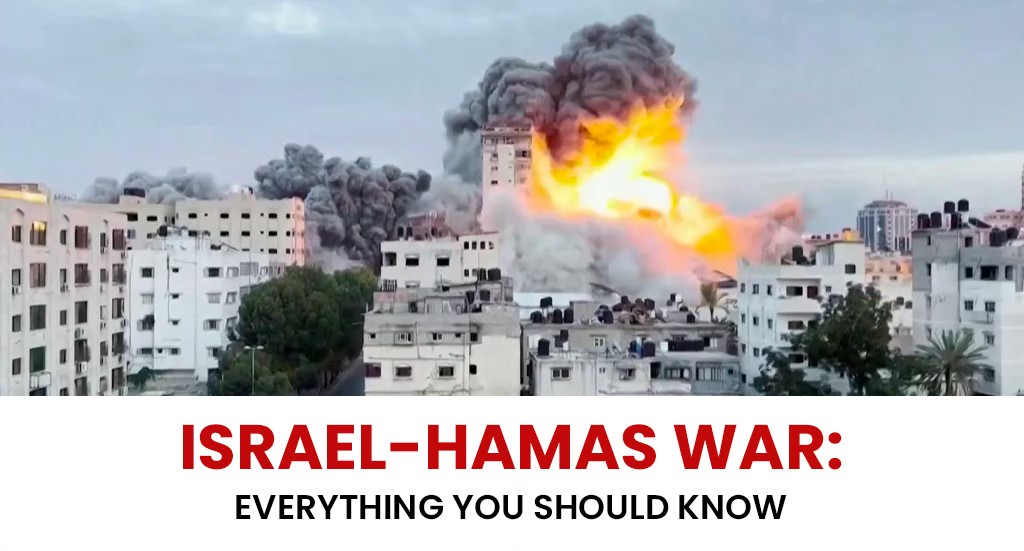On Saturday, Palestinian Islamist organisation Hamas initiated a significant assault on Tel Aviv on a day that was a festive holiday in Israel, leading to a military conflict with the Israeli authorities. During this escalation, which Hamas said marked the commencement of “Operation Al-Aqsa Flood,” an estimated 5,000 missiles were launched from the blockaded Gaza Strip into Israel. More than a 1000 armed Hamas gunmen then crossed the border fence in Gaza into Israel, swarming to nearby Jewish communities, going from house to house, mowing down people or abducting them back into Gaza, leading to the tragic loss of civilian and military lives. More than 200 people in Israel were killed and more than 1,100 wounded in the offensive. This assault was the deadliest such incursion since Arab states (Egypt and Syria) blitzed Israel on the Yom Kippur, the holiest day of the Jewish calendar 50 years ago.
Unconfirmed video footage depicted horrified Israelis, some with bloodstains, their hands bound, being led away by Palestinian gunmen. As the violence unfolded, numerous individuals sought refuge in secure rooms within their residences.
In response, Israel declared a state of war and launched intense military strikes on densely populated areas in Gaza, resulting in the loss of hundreds of lives.
Following a security cabinet meeting, Prime Minister Benjamin Netanyahu stated that Israel had entered the “offensive phase” of the conflict and committed to its continuation “without any restrictions or breaks until the goals are accomplished.”
Since the attack on Saturday, the conflict has tragically claimed the lives of more than 1,100 individuals on both sides. Israel has responded with significant military action. In the past 24 hours, the Gaza Strip experienced its most devastating day in 15 years, with nearly 300 Palestinians losing their lives due to Israeli airstrikes.
Rear Admiral Daniel Hagar, the spokesperson for the Israel Defense Forces, described the Hamas attack as a “war crime” and emphasised that those involved would face consequences. In a video message posted on the official Israel Defense Forces social media account, Hagar stated, “Hamas’ brutal assault is a violation of international law and Islamic principles, particularly in taking women and children as captives. Anyone who participated will face accountability. We are facing tough and challenging times in this war. The IDF is resolute and will employ its full strength and capabilities.”
Cause of the Escalation by Hamas
In an official statement, a Hamas commander justified the attacks on Israeli territory as a defensive response to the recent incursion by Israeli settlers into the Al-Aqsa mosque, which has long been a contentious focal point in the Palestine-Israel conflict. Hamas military commander Muhammad Deif, in a recorded message following the attacks, asserted that these strikes were a retaliation against Israel for what he described as the “violation” or “desecration” of the Al-Aqsa mosque in Jerusalem.
What’s Behind theOngoing Terror Attacks?
The roots of this matter can be traced back to the Israel-Palestine conflict, which has had far-reaching implications on regional politics. A crucial aspect in this context is the city of Jerusalem and its environs, which have immense religious and cultural significance for three major Abrahamic faiths: Christianity, Islam, and Judaism. Consequently, asserting claims over this land has been a matter of great importance for various groups.
In contemporary history, after World War II and in response to the persecution of the Jewish population in Europe, a significant wave of migration occurred towards Western Asia and Palestine. In 1947, the United Nations approved a partition plan for the area, proposing the division of the region into Arab and Jewish territories, but this plan was rejected by Arab parties. Additionally, during this period, the concept of a “promised land” for Jewish people gained momentum, and following the post-World War II migration, the state of Israel was established in 1948.
As a result of these events, Arab states launched an attack against Israel in 1948, leading to what became known as the Nakba or “catastrophe.” According to the Council on Foreign Relations (CFR), the United Nations estimated that approximately 750,000 Palestinians were displaced after Israel emerged victorious, with strong American support. Subsequently, Palestinians sought refuge in areas like the Gaza Strip, along the Mediterranean Sea, and the West Bank.
Efforts were made over time to reinforce the territorial integrity of two separate states, Israel and Palestine, by partitioning the region, but none of these proposals received universal acceptance. Throughout the years, numerous conflicts erupted between Israel and Arab nations over territories that Israel had annexed, including the Golan Heights in Syria (which it still controls) and the Sinai Peninsula (which has since been returned to Egypt).
The conflict seems to be never ending as the two states overlook everything when it comes to power and entitlement. It is only for the time to tell when this issue would resolve for a peaceful environment.
Israel and Palestinian militants have fought several wars since Hamas took power in Gaza in 2007.








